Arts & Culture

"WE ARE WHAT WE PRETEND TO BE,” Kurt Vonnegut once observed. “So we must be careful about what we pretend to be.” What a funny and paradoxical and intensely true thing to say. This is indeed the drill. The world runs on pretense. We play along with norms, strengthening their power as we go, borrowing a sense of legitimacy—sometimes trading in acts of legitimation with others—in the hope of being seen by others as credible and worthy of a salaried position.
If we aren’t careful, we learn to stop asking whether the reigning legitimacies in which we live and move are, in fact, good or worthy or true. When they aren’t, our pretense is a form of earnest wickedness. I’ve gained power, a tiny world of fake legitimacy, while slowly and dutifully forfeiting my soul. I’ve become what I’ve played at and lost any righteous sense of self and others in exchange for status. Henry David Thoreau described the way his own conscience sometimes succumbed to such peer pressure thusly: “The greater part of what my neighbors call good I believe in my soul to be bad, and if I repent of anything, it is very likely to be my good behavior. What demon possessed me that I behaved so well?”
We are, of course, responsible for our own words and actions, but we’re also responsible for the conflicts we avoid to more effectively get by, the lies we allow others to propagate unchallenged in our presence. Thoreau worried over all the ways he played along and didn’t raise a fuss in the face of the terrors his government enacted and the subtle fashion in which his own behavior, by proving polite and acceptable, abided injustice.

Be still. Don’t forget how the Earth shifted—
dinner plates with clean breaks in smashed boxes—
and lands became continents, broken homes.

I'M TOO OLD, and so are my children, to set out cookies and milk for you. But I’m still hopeful enough to write you another letter.
Last year, with all the earnestness I could muster, I asked you for a white people intervention—many white progressive and evangelical Christians in the same room for a cleansing flood of white tears, some deep breathing and healing prayer, and time to plan to dismantle white supremacy from the inside.
But I have not received word that an intervention took place. I assume invitations to it went out or it got canceled, postponed, or taken over by the announcement of Supreme Court Justice Anthony Kennedy’s retirement. (Was that supposed to be a Christmas-in-summer gift?)

WHEN TERESA P. MATEUS attended gatherings on Christian contemplative spirituality, she often didn’t see herself reflected in the spiritual practices “centered in whiteness” that she found emphasized there. She yearned for spiritual resources that drew on the experiences of people of color—and out of that yearning, the Mystic Soul Project was born.
Mateus is a graduate of the New York University School of Clinical Social Work and the Living School at the Center for Action and Contemplation and author (under the name Teresa B. Pasquale) of two books on recovery after trauma, including Sacred Wounds: A Path to Healing from Spiritual Trauma. Da’Shawn Mosley, assistant editor of Sojourners, spoke with Mateus in August about how the Mystic Soul Project brings healing and spiritual nourishment to people on the margins.
Da’Shawn Mosley: Tell us about the Mystic Soul Project.
Teresa P. Mateus: Our basic mission is activism, mysticism, and healing centered around the life experiences of people of color. We create space for conversations, relationship building, practices, and other programming that have a people-of-color perspective and allow many to reclaim ancestral practices that have been abandoned or erased by Western traditions.

For too many Christians, the argument that we should love others because Jesus told us to becomes a begrudging obligation rather than a willful choice. If the only thing that drives Christians to accept disenfranchised people is Jesus, there is a lack of authenticity in that connection. The implication is that without Jesus, there would be no intrinsic value to diversity.

The work of liberation is long and hard, but music is one way we are sustained and renewed. I asked women in the throes of decolonization, activism, community organizing, pastoring, and liberative writing what songs encourage them as they engage in the work of justice and resistance. Here are their responses.

ProPublica has released a new interactive database that allows users to examine racial disparities in more than 96,000 individual public and charter schools, and 17,000 districts across the United States.
You can search the racial composition of individual schools and also compare school districts on issues of opportunity, discipline, segregation, and achievement gap.

As a civil rights activist from the civil rights movement of the ‘60s, I continue to believe that everyone has constitutional rights. Thousands of Americans are being denied their civil and human rights because insensitive or politically manipulated legislators are creating policies that are destroying the environment. When profits, rather than the well-being of human and environmental life, determine the survival of the planet, it is a civil rights issue.

Alaska has a “linguistic emergency,” according to the Alaskan Gov. Bill Walker. A report warned earlier this year that all of the state’s 20 Native American languages might cease to exist by the end of this century, if the state did not act. American policies, particularly in the six decades between the 1870s and 1930s, suppressed Native American languages and culture. It was only after years of activism by indigenous leaders that the Native American Languages Act was passed in 1990, which allowed for the preservation and protection of indigenous languages. Nonetheless, many Native American languages have been on the verge of extinction for the past many years.

One of the highlights of my trip to Costa Rica was visiting Teatro Nacional de Costa Rica in San Jose. Taking a break from the beaches and after consuming a healthy amount of papaya and platanos, I wanted to go there to see the area outside the theater, which has busts of some of the Central American country’s famous writers: Eunice Odio, Joaquín Gutierrez, and Yolanda Oreamuno. After the visit, with the help of some of my tias and primas, I even brought home a few books from these authors. They were particularly pleased I was interested in reading literature from Costa Rica.
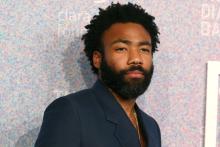
Donald Glover aka Childish Gambino has become a cultural icon. From his comedic work in Community to his acting in both Marvel and Star Wars franchises to his writing and producing of the critically acclaimed show Atlanta, the versatile Grammy-nominated artist is a creative force. Throughout all of this commercial and critical success, Donald Glover has refused to frame his work as a product; instead he wants to offer a participatory experience, a religious experience even.
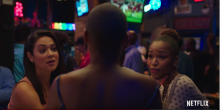
Much more than a depiction of self-imposed self-work, Nappily Ever After, directed by Haifaa Al-Mansour, challenges viewers to wholeheartedly release the things that chain them. It is a story about rejecting whom others say we are and celebrating the person we know ourselves to be.

On your mother’s side Abyssinian slaves,
grandees from Spain on your father’s.
How could someone dark
as a Dominican’s cappa with a burnt
oak face and a halo of knotted hair
be the patron of holiness?
Barbering and sweeping were not
causes for sainthood.
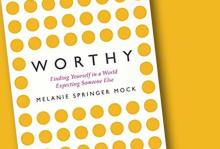
WHEN MELANIE MOCK, author of the new book Worthy: Finding Yourself in a World Expecting Someone Else, realized as a teen that her newly acquired designer jeans would not lead her to immediate popularity, she bumped into questions I’m sure many of us face: Where does our worth come from? How do we get to the point where we truly believe we are worthy and beloved just as we are, as the children of God? Through sometimes humorous, sometimes heartrending, and always poignantly honest stories from her own experience, Mock opens the vulnerable space within to attend to the stories we tell ourselves about our value.
Mock’s stories point out the hidden messages about worthiness given to us by American culture, in particular the evangelical subculture, contrasting the messages of the “purity culture” with the biblical promises of our innate belovedness. She builds on the groundwork laid in If Eve Only Knew: Freeing Yourself from Biblical Womanhood and Becoming All God Meant for You to Be (Chalice Press), which she co-wrote with Kendra Weddle Irons.
While she focuses primarily on the messages given to white evangelical women, since this is her experience, she recognizes her privilege, as well as the parallels between the unhealthy and often impossible implicit standards American evangelicals hold for women, people of color, and LGBTQ+ folks, all who do not meet a white male “norm.” Mock addresses how evangelical cultures tend to create double standards for women, requiring a type of “purity” that has nothing to do with Christianity. She shares honestly about the fear that even when she seems to be fitting the mold of the ideal Christian woman, at any moment the façade of the successful mother/wife/professor will be unmasked.

WHEN DANIEL and Philip Berrigan, A.J. Muste, John Howard Yoder, and a handful of Catholic radicals gathered in 1964 with Thomas Merton at the Abbey of Gethsemani in Kentucky for a retreat concerning the spiritual roots of protest, the intercessions of that meeting, I am convinced, not only seeded a movement but summoned my vocation.
Four years later when Daniel and Phil Berrigan and seven others entered the draft board in Catonsville, Md., removed 1A files and burned them with homemade napalm, those ashes too would eventually anoint my pastoral calling. October marks the 50th anniversary of the trial of the Catonsville Nine. Released in February 1973 after 18 months in the federal penitentiary at Danbury, Conn., Daniel Berrigan came to New York and taught the Apocalypse of John when I was a student at Union Seminary. Full disclosure: He became to me not merely teacher, but mentor and friend.
In the year following Dan’s death (April 30, 2016), Jim Forest undertook the heroic literary effort of writing At Play in the Lions’ Den. Perhaps he had a running start. Three things of note up front. One is that Forest’s own life is inextricably tangled with Berrigan’s. He was, for example, editor of The Catholic Worker when Dan first appeared there, was part of the 1964 retreat with Merton, and responded to Catonsville by joining others in a draft board raid in Milwaukee within the year. So, like the Acts of the Apostles, there are whole sections of this book written in the first-person voice. Or betimes, Forest just peeks from behind the elegantly researched narrative to lend a knowing detail. This is a risky wire act. Don’t fall into self-aggrandizement (his genuine modesty saves him that) or the net of hagiography. And best to name this from the start, in the subtitle: “biography” and “memoir,” a difficult art Forest has mastered.
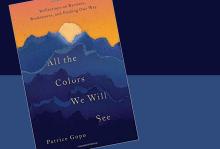
EQUAL PARTS brilliant imagery and candid reflection, All the Colors We Will See is a story on becoming. With vivid attention to detail and a deep reservoir of wisdom, Patrice Gopo has carefully crafted a collection of essays on love, loss, and longing.
This story begins in the 1980s, weaving together layers of identity formation as we learn Gopo’s background as the daughter of Jamaican immigrants and explore her adolescent upbringing in Anchorage, Alaska. Throughout this book Gopo intimately relays her difficulties as a constant minority—African American with some East Indian heritage—often lacking cultural peers in her evolving spaces. From witnessing the acquittal of O.J. Simpson at her predominantly white high school to finding black community at Carnegie Mellon University to meeting the love of her life in Cape Town, South Africa, we are taken on a journey of self-discovery and self-acceptance.
This book is not merely reflection. It is a deeper introduction to the complex intersection of race and immigration and how these can inform one’s developing sense of self. Time and time again, Patrice Gopo lives into an identity as an “other,” struggling to find her fit.
“‘I don’t really think of you as being black,’ a dear college friend once said to me,” Gopo writes. “I held the phone against my ear and paused a moment as mild indignation crept through my mind. ‘Of course I’m black,’ I replied.”

A TRAUMATIZED Iraq War veteran and Oscar Wilde don’t immediately invite comparison, but in two current films they could be scapegoated brothers. The Happy Prince, a labor of love for its writer-director-star Rupert Everett, and Leave No Trace, director and co-writer Debra Granik’s first fiction feature since Winter’s Bone, are both about men in a wilderness, not because they have done anything wrong but because the dominant culture doesn’t want to see them. And I mean truly see them—especially the way they may remind us of discomfort with ourselves.
In Leave No Trace, Ben Foster’s Will has given mind and body for his country and wants to live where he feels safest—in the woods. He handles himself and keeps his daughter (the brilliant Thomasin McKenzie) physically safe, emotionally healthy, and growing in knowledge of the world, but because he doesn’t care for the “system” that harmed him, he must hide or jump through hoops to prove he’s as good as anyone else.
Everett’s Oscar Wilde, in The Happy Prince, is trying to make a life after being imprisoned for love. The first prison was the love itself, love made torment by bigotry; the second a literal jail. He’s broke and broken. He doesn’t always treat others well, but aches to grant the world what he can: amusement at ourselves mingled with compassion for those living “in the gutter,” whether or not they can see the stars. These beautiful films offer hope without cliché, recognizing that our experience of tragedy always coexists with love.

FOR 20 YEARS, Alex Jones, a radio show host and founder of the Infowars website, has been spreading one off-the-wall conspiracy theory after another, and, for the past decade, social media have amplified his voice and his reach to a level his predecessors on the “paranoid Right” could never have imagined. In early August, Facebook and Google-owned YouTube finally took measures to effectively ban Jones from their platforms. But the way they did it raises more questions than it answers about the possibility of restoring respect for truth to public life in the United States.
Way back in the dying days of the 20th century, Alex Jones started his career ranting about the old conspiracy standbys, such as fluoride in our drinking water. But then 9/11 happened, and Jones took his act to a whole new level, claiming that the attacks on the World Trade Center and the Pentagon were really “inside jobs” unleashed by the secret government to launch a global war and suspend civil liberties.
In days gone by, such a theory would have been passed around on mimeographed fliers, and mainstream journalism, shackled by considerations of fact, wouldn’t have touched it. But the social media era has freed us from all that. Now anybody can say anything, and everybody can hear it. Suddenly Alex Jones had an audience of millions for his Facebook pages, his YouTube channel, and his website; this success seemed to egg him on to ever more outrageous pronouncements. Finally, he hit rock bottom with the claim that the Sandy Hook school shooting was faked (to provide a pretext for seizing Americans’ guns) and all those grieving parents were only acting.

In America’s children, we often see hope for a better future, especially when it comes to reducing racism. Each new generation of white people, the thinking goes, will naturally and inevitably be more open-minded and tolerant than previous ones. But do we have any reason to believe this? Should we have faith that today’s white kids will help make our society less racist and more equitable? Previous research has had mixed findings. So in order to explore more fully what white kids think about race, I went straight to the source: white children themselves.
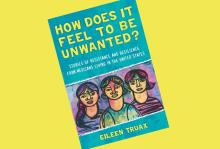
Life Stories
In How Does It Feel to Be Unwanted? Stories of Resistance and Resilience from Mexicans Living in the United States, LA-based (and Mexico City born)journalist Eileen Truax responds to rampant xenophobia with 13 profiles that highlight ways Mexican immigrants have overcome exclusion over the past 30 years. Beacon Press
Prophetic Compassion
On his new album, Nothing Like the Rain, singer-pianist-songwriter Ken Medema’s soaring voice, storytelling gift, and deep compassion deliver songs infused in turn with praise and scriptural wisdom. He lifts up stories of the broken and brokenhearted, invoking the call to both justice and mercy. Brier Patch Music